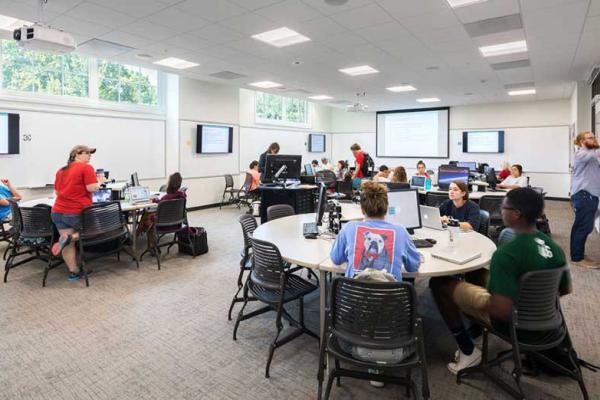Vancouver Island University is committed to creating a safe and resilient campus for all students, faculty, staff and visitors.
Stay informed and learn the emergency procedures so you’ll know what to do in an emergency. You play an important role in helping keep our campus safe and ready for emergencies.
Building occupant response
Most of our emergency procedures require one of the following three responses:
Evacuation: When it is unsafe to remain in a building. Immediately exit the building and proceed to the designated Evacuation Point. If outside, proceed to the nearest Evacuation Point.
Shelter in Place: When it is hazardous to be outside. Remain indoors and close any open doors or windows. If you are outside, proceed indoors to the nearest building.
Lockdown: When there is a real and imminent threat of violence and it may be dangerous to evacuate a building. Stay inside and hide, lock and barricade doors.
Detailed procedures
- Call 911.
- For Security or First Aid, contact Campus Security at 250.740.6512.
- Naloxone Kits are available on all VIU campuses and in VIU Student Housing.
- Automatic External Defibrillators (AED's) are located on all VIU campuses.
- Activate the nearest fire alarm pull station.
- Call 911 and then call Campus Security at 250.740.6512.
- Evacuate the building by the safest exit.
- Proceed to Evacuation Points and look for an Emergency Warden or Emergency responder for directions.
- Do not re-enter the building until directed by emergency personnel.
- If you or someone you are with cannot evacuate, proceed to a stairwell and wait for help.
During an Earthquake
Drop, Cover, and Hold On, and stay in this position for at least 60 seconds.
When the shaking starts
- If you are inside, immediately drop, cover & hold on under a table or desk, or against an inside wall (not in a doorway) until the shaking stops. Crouch between rows of lecture theatre seating.
- If you are outside, go to an open area. Try to stay away from buildings, power lines, trees or other potential hazards. Drop, cover and hold on until the shaking stops.
- If you are in a car or parking lot, stop the vehicle and stay where you are.
What's next after the shaking stops
- Strong aftershocks can occur and continue for some time after an initial earthquake. Be prepared to drop, cover and hold on again at any time.
- Check yourself for injuries.
- When at least 60 seconds has passed without aftershocks cautiously assess your surroundings. If there is damage to your building (e.g. fallen ceiling tiles, broken lights or glass, wall or foundation cracking), carefully evacuate.
- Assist others who need help or report locations of people requiring assistance to emergency wardens. If emergency assistance is required call 911. Also contact Campus Security at 250.740.6512 or by sending a runner to your evacuation point.
- Evacuate the building and proceed to an Evacuation Point carefully considering outside hazards that may be present such as downed power lines, broken glass, falling objects and debris.
- NOTE:
- In a real emergency, emergency notifications will be delayed so employees can also Drop, Cover, Hold On.
- Expect a delay before you can re-enter buildings.
- Take your personal belongings (e.g., keys and wallet) with you, if immediately accessible
- NOTE:
- Wait for an all clear message on Mass Notification Systems before re-entering buildings.
- Minimize your use of telephones to prevent overloading responders.
- Do not pull the fire alarm unless there is a fire.
Shelter in place when it is unsafe to be outdoors. Remain indoors and close any open doors and windows. If you are outside, proceed indoors. Examples:
- Incidents in close proximity to a VIU campus or site.
- Serious impacts to air quality such as hazardous material release, chemical, biological, or other hazardous substances in solid, liquid or gaseous form.
- Severe weather such as snow or wind impacting access and egress routes to a campus or site.
- Other hazards which create a health or safety risk in the immediate area (dangerous wildlife, police incident, fire).
Lockdown by staying inside a classroom, room or office, secure the door(s) and windows and await further instructions.
- If the door does not lock, barricade the door with tables and chairs.
- If you are in a corridor go into the closest room not already secured and lock and/or barricade the door and windows.
- Close curtains or blinds where possible.
- Stay away from windows and doors.
- Turn off the lights.
- Stay low and quiet.
- Silence cell phones, do not make non-essential calls.
- Do not open the door for anyone.
- Remain in place until VIU issues an “All Clear” message or the door is opened by emergency personnel, carefully follow instructions.
If you are caught outside
- Immediately leave the campus if it is safe to do so.
- If leaving is not possible, hide or crouch behind / under shrubbery and trees etc.
- Report the outage by calling Campus Security at 250.740.6512.
- Unplug voltage sensitive equipment.
- Secure any lab equipment and shut off gasses.
- Secure any mechanical equipment/processes and shut off gasses.
- Wait for further instructions from your Supervisor.
Up to date outage information is provided by BC Hydro.
- Evacuate the immediate area and shut down any equipment.
- If there is risk of fire or explosion, or if there are injuries, call 911.
- Call Campus Security at 250.740.6512.
- Alert people in the immediate area to evacuate if materials are toxic. Do not use the fire alarm system to alert people unless there is a fire.
- Evacuate the building and proceed to Evacuation Points.
- Report a hazardous spill to your manager or a faculty member immediately.
For more information on Chemical Safety, please visit Health and Safety Services.
Vancouver Island and all VIU campuses and sites are home to a diverse range of wildlife. While it is unlikely you will encounter large wildlife like bears and cougars on our campuses, it is always a possibility so it is important to know that it is never safe to approach them.
Bear encounters
If the bear has not seen you:
- Move away quietly and go inside the nearest building to Shelter in Place.
If the bear is aware of you:
- Do not run. Stay calm and face the bear directly.
- Make yourself look big by spreading your arms.
- Talk in a loud voice and make a lot of noise.
- Back away slowly and never turn your back on the bear.
Cougar encounter
- Cougars will normally avoid a confrontation.
- Do not run. Stay calm and talk in a loud confident voice.
- Pick all children up of the ground immediately.
- Try to back away from the cougar slowly. Do not turn your back on the cougar.
When you are safe, please report dangerous wildlife sightings that could pose a risk to the public by calling Campus Security at 250.740.6512.
Natural gas smells like rotten eggs. If you smell natural gas or hear the sound of a gas leak do the following:
- Stop what you are doing, Do not use your cell phone or landline, or operate electrical switches.
- Verbally announce the need to evacuate the building. Do not pull the fire alarm.
- Once outside, move to designated building evacuation points and DO NOT re-enter the building until directed by emergency personnel.
- Call Campus Security at 250.740.6512.
All threats must be taken seriously and treated as though an explosive device is present on campus.
Immediate action
- Call 911 (RCMP) immediately.
- Then contact Campus Security at 250.740.6512.
- If an explosion occurs, evacuate the building calmly and quickly.
If you receive a bomb threat
Bomb threats can be delivered by phone, email, or letter. If you receive a phone call threat:
Stay calm and gather as much information as possible
- Do not hang up. Keep the caller on the line.
- Be polite and cooperative—do not upset the caller.
Record the following
- Time the call was received.
- Phone number or line the call came through.
- Exact words of the caller (especially details about the bomb or timing).
- Background noises (e.g., traffic, music, machinery, voices).
- Ask questions, if you can:
- Where is the bomb?
- When is it set to go off?
- What kind is it?
- What does it look like?
- Permit the caller to say as much as possible without interruption.
Suspicious Object
- Do not touch or disturb the object.
- Evacuate to a safe location and call 911 and hen Campus Security at 250.740.6512.
Quickly determine the best way to protect yourself and, when it is safe to do so, call 911 and Campus Security at 250.740.6512.
Get Out
-
Consider a safe exit. Keep your hands visible and follow police instructions.
Hide
- Lock and barricade doors and windows.
- Turn off lights, stay behind solid objects away from doors and windows.
- Be quiet, silence cell phones.
Fight
If you are caught in an exposed area and cannot get into a classroom or office you must decide on a course of action.
- Improvise weapons from nearby objects.
- Work together with others around you.
- Commit to an aggressive attach as a last resort. Incapacitate the assailant by any means available.
Preparation and Planning
What is an Armed Intruder?
An Armed Intruder is an individual actively engaged in killing or attempting to kill people in a confined and populated area. There is usually no apparent pattern or method to how they choose their victims. These events are rare in Canada.
Armed intruder or active shooter situations can be over within 10 to 15 minutes. For this reason it is important that you are prepared to act quickly to protect yourself.
You Can Prepare Yourself
- You can make a difference by thinking about places your work and study. Where are the exits? Do the doors lock? What would make a good barricade? What would make a good weapon? This kind of thinking is helpful in preparing for all kinds of emergencies, wherever you may go. Prepare as a department by completing the Lockdown - Guide for Departments and Faculties.
About the Police
- They may not have time to help you when they first arrive as their top priority will be to find and stop a threat. For that reason, if you encounter police, don’t run toward them. Remain calm. Keep your hands visible. Follow instructions.
Reporting a Concern
- If someone is committing violence, or about to commit violence, at the university, call 911.
- If you are worried about something you observe or have a worried feeling about someone but aren’t sure what to do, contact Campus Security at 250.740.6512 or your supervisor or complete an incident report.
Other Canadian University Resources
University of Alberta “shooter on campus – know you can survive” video








